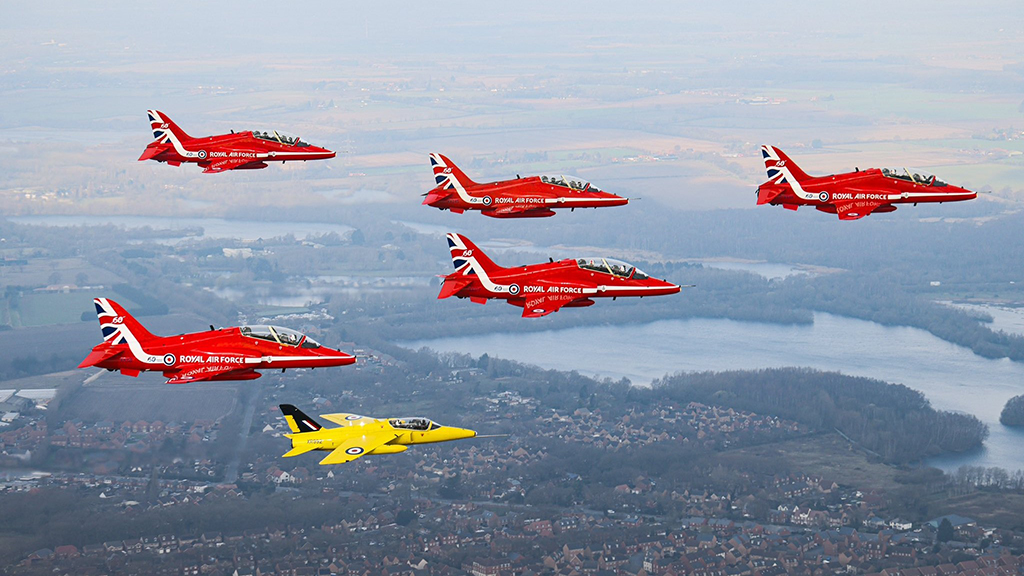RAF Red Arrows Celebrate Start Of Their 60th season With Original Folland Gnat In Formation


A vintage Folland Gnat flew in formation with the Red Arrows to mark their 2024 Diamond Season.
On March 8, 2024, an ex-RAF Folland Gnat flew in formation with the RAF Red Arrows aerobatic display team on a special occasion marking their 60th display season. The Folland Gnat was the Red Arrows’ initial display aircraft when the team first started their display in 1965. The type was later replaced by the BAE Systems Hawk T1 in 1979.
The Red Arrows have announced that their 2024 campaign would be their Diamond Season, celebrating their 60 years of history as the Royal Air Force’s main aerobatic display team. The special formation flight was organized above RAF Waddington to celebrate the start of their special Diamond Season.
Squadron Leader Jon Bond, who will lead the team as Red 1 for the first time this year, remarked on this occasion; “To bring together the past, present and potential future of the Red Arrows is the perfect way to launch our 60th season display calendar.
Soaring over Lincoln – awesome air-to-air footage of the #RedArrows’ Hawks being joined by a classic Folland Gnat jet to help launch the Royal Air Force Aerobatic Team’s 60th display season. pic.twitter.com/dJ3kgnqXg4
— Red Arrows (@rafredarrows) March 8, 2024
The Red Arrows first flew in 1965, replacing the former Yellowjacks
The Folland Gnat served as the Royal Air Force’s main trainer aircraft from 1955, serving with the Red Arrows from 1965 to 1979. The Gnat that took part in the honorary formation, G-MOUR, donned a bright yellow livery of XR992. The livery is that of the RAF Yellowjacks, a direct predecessor to the RAF Red Arrows. The Yellowjacks first formed informally in 1963 led by Flight Lieutenant Lee Jones at No. 4 Flying Training School, RAF Valley. With some disapproval by higher authorities, the aerobatic team was reformed as the current Red Arrows in 1965.
It should be noted that G-MOUR, currently operated by Heritage Aircraft LTD, was actually never part of the RAF Red Arrows nor the Yellowjacks. Instead, the airframe flew under No. 4 Flying Training School as XS102 since 1962.
G-MOUR is wearing the former RAF Yellowjacks display team livery, a predecessor to the Red Arrows (Photo: RAF)
” data-medium-file=”https://i0.wp.com/theaviationist.com/wp-content/uploads/2024/03/Red-Arrows-Formation-1.jpg?fit=460%2C259&ssl=1″ data-large-file=”https://i0.wp.com/theaviationist.com/wp-content/uploads/2024/03/Red-Arrows-Formation-1.jpg?fit=706%2C397&ssl=1″ decoding=”async” class=”size-large wp-image-84980″ src=”https://i0.wp.com/theaviationist.com/wp-content/uploads/2024/03/Red-Arrows-Formation-1.jpg?resize=706%2C397&ssl=1″ alt width=”706″ height=”397″ srcset=”https://i0.wp.com/theaviationist.com/wp-content/uploads/2024/03/Red-Arrows-Formation-1.jpg?resize=706%2C397&ssl=1 706w, https://i0.wp.com/theaviationist.com/wp-content/uploads/2024/03/Red-Arrows-Formation-1.jpg?resize=460%2C259&ssl=1 460w, https://i0.wp.com/theaviationist.com/wp-content/uploads/2024/03/Red-Arrows-Formation-1.jpg?resize=128%2C72&ssl=1 128w, https://i0.wp.com/theaviationist.com/wp-content/uploads/2024/03/Red-Arrows-Formation-1.jpg?resize=768%2C432&ssl=1 768w, https://i0.wp.com/theaviationist.com/wp-content/uploads/2024/03/Red-Arrows-Formation-1.jpg?resize=678%2C381&ssl=1 678w, https://i0.wp.com/theaviationist.com/wp-content/uploads/2024/03/Red-Arrows-Formation-1.jpg?w=1024&ssl=1 1024w” sizes=”(max-width: 706px) 100vw, 706px” data-recalc-dims=”1″>
Under the formal name of the Royal Air Force Aerobatic Team, the Red Arrows were first based at RAF Little Rissington in Gloucestershire. The team took home around the UK before settling down at RAF Scampton for the longest time before its closure in 1995. From October 2022, RAF Waddington has been the team’s home base. Despite RAF Scampton’s closure, the Red Arrows still use the airspace above the former base as their main area of training.
The Red Arrows’ first official display was on May 6, 1965, as a media affair, with the first public display happening three days later in Clermont-Ferrand as part of the French National Air Day. The team currently boast a record of over 4,800 displays in 57 countries over the years. In their 1995 season, the Reds displayed a record breaking 136 times in a single year. The biggest tour happened only a few years back in 2019 during the Red Arrows’ North American tour during which 21 displays and 30 flypasts were made over 25 cities.
2024 Red Arrows Diamond Season display schedule has also been released
With the 2024 display schedule released, the Red Arrows are set to kick off their Diamond Season in Souda Bay, Greece on May 21 at the Battle of Crete Commemoration. With this year marking the 80th anniversary of the D-Day landings, the teams’ activities are expected to be focused along the English Channel.
While the Red Arrows’ 50th anniversary in 2014 saw the Hawk T1 with a special commemorative tail, this 60th anniversary livery is expected to be more subtle with an added decal on the rear fuselage and tail.
Announced schedule for the Red Arrows’ 60th anniversary Diamond Season (Photo: RAF)
” data-medium-file=”https://i0.wp.com/theaviationist.com/wp-content/uploads/2024/03/Red-Arrows-Formation-2.jpg?fit=460%2C460&ssl=1″ data-large-file=”https://i0.wp.com/theaviationist.com/wp-content/uploads/2024/03/Red-Arrows-Formation-2.jpg?fit=706%2C706&ssl=1″ decoding=”async” loading=”lazy” class=”size-large wp-image-84981″ src=”https://i0.wp.com/theaviationist.com/wp-content/uploads/2024/03/Red-Arrows-Formation-2.jpg?resize=706%2C706&ssl=1″ alt width=”706″ height=”706″ srcset=”https://i0.wp.com/theaviationist.com/wp-content/uploads/2024/03/Red-Arrows-Formation-2.jpg?resize=706%2C706&ssl=1 706w, https://i0.wp.com/theaviationist.com/wp-content/uploads/2024/03/Red-Arrows-Formation-2.jpg?resize=460%2C460&ssl=1 460w, https://i0.wp.com/theaviationist.com/wp-content/uploads/2024/03/Red-Arrows-Formation-2.jpg?resize=96%2C96&ssl=1 96w, https://i0.wp.com/theaviationist.com/wp-content/uploads/2024/03/Red-Arrows-Formation-2.jpg?resize=768%2C768&ssl=1 768w, https://i0.wp.com/theaviationist.com/wp-content/uploads/2024/03/Red-Arrows-Formation-2.jpg?w=1024&ssl=1 1024w” sizes=”(max-width: 706px) 100vw, 706px” data-recalc-dims=”1″>
As a side note: by pure accident we have discovered that the team, for unknown reasons, has blocked us on X.
Shocked to discover, while publishing an article on the 60th anniversary of the team, that @rafredarrows blocked us. Never had a single interaction of any type with them on social media, therefore I kindly ask @RoyalAirForce, that follows us, to clarify. pic.twitter.com/DHnhbRYHAP
— The Aviationist (@TheAviationist) March 10, 2024
